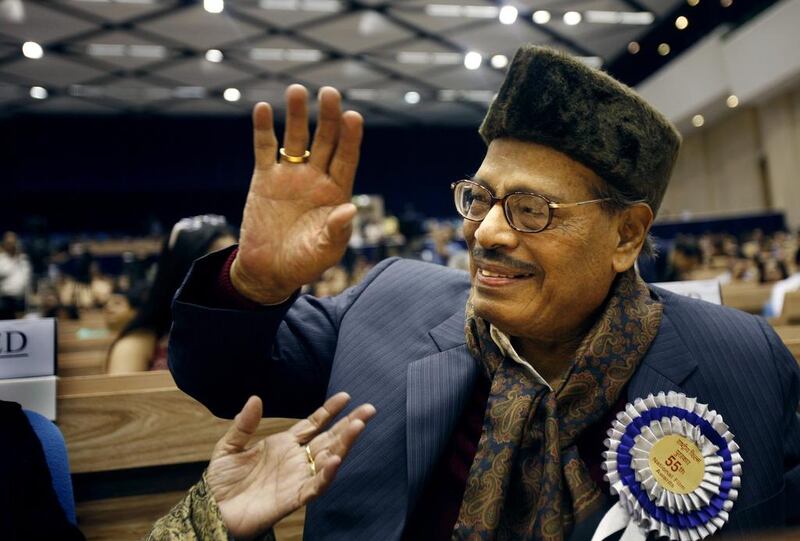NEW DELHI // Manna Dey, the last surviving member of a quartet of singers from Hindi cinema’s golden age, died of a respiratory infection in Bangalore today at the age of 94.
Born Prabodh Chandra Dey, he was recognised easily by his pencil moustache and his trademark Kashmiri fur cap, and enjoyed his heyday between the 1950s and the 1970s, singing primarily in Hindi and Bengali. But he was versatile enough to sing in other languages and one of his most famous songs appeared in the 1965 Malayalam movie Chemmeen.
He continued to work in cinema until 2006, recording over 3,500 songs, drawing upon his education in classical music but willing to experiment with the idiosyncratic.
Unlike Kishore Kumar, Mukesh Mathur and Mohammad Rafi — the other members of that famed quartet — Dey sang frequently for secondary characters, as opposed to the lead romantic hero.
“He wasn’t well for a long time,” SF Karim, chief manager at Saregama India, a recording company, told The National. “The last time I saw him was in February, when I went to see him at his home. We talked for an hour — mostly about Bengali music, and a flashback to his Bollywood days.”
Dey was born in Kolkata, then Calcutta, in 1919, into a large family that enthusiastically supported the arts. He started to take singing lessons first from his uncle and then from Ustad Dabir Khan, an exponent of Hindustani classical music on a string instrument known as the Rudra Veena.
In 1942, Dey moved to Mumbai, formerly Bombay, where he established himself first as an assistant to film music directors. The next year, he made his singing debut, and by the early 1950s, his career started to flourish.
It was not always easy going in those early days, Dey told an interviewer a decade ago.
“I was constantly approached to sing for old bearded characters in movies and I was barely in my early twenties,” he said. “It was a very trying time for me ... I was in two minds whether to return to Calcutta or to stay on and not give up.”
Through the 1950s and 1960s, Dey tirelessly expanded his repertoire, singing in as many as 16 Indian languages.
Dey was known for his flexibility. The music director of Chemmeen chose Dey for a key song, according to the film historian N Balagopal, because “the emotional intensity of this song could be imbibed by no singer other than Manna Dey”.
“This is a song that stands out by its romantic charm as well as expression of pathos of a forlorn lover,” Mr Balagopal told the Press Trust of India yesterday. “The sweetness of his voice and the tenor of rendering even blurred minor lapses in pronouncing some of the Malayalam words.”
Dey’s film career slowed down in the 1980s, with the advent of new singers and new styles of music. He stopped singing for Bollywood after 1992, although he continued to perform live and to sing for Bengali films.
India’s prime minister, Manmohan Singh, led the tributes for Dey.
“In his death, the music world has lost one of its most talented artistes. Dey’s legacy will, however, live on through the many songs he sang,” Mr Singh said.
Dey is survived by his daughters Suroma and Sumita. His wife Sulochana passed away last year.
ssubramanian@thenational.ae
* With additional reporting by Suryatapa Bhattacharya





